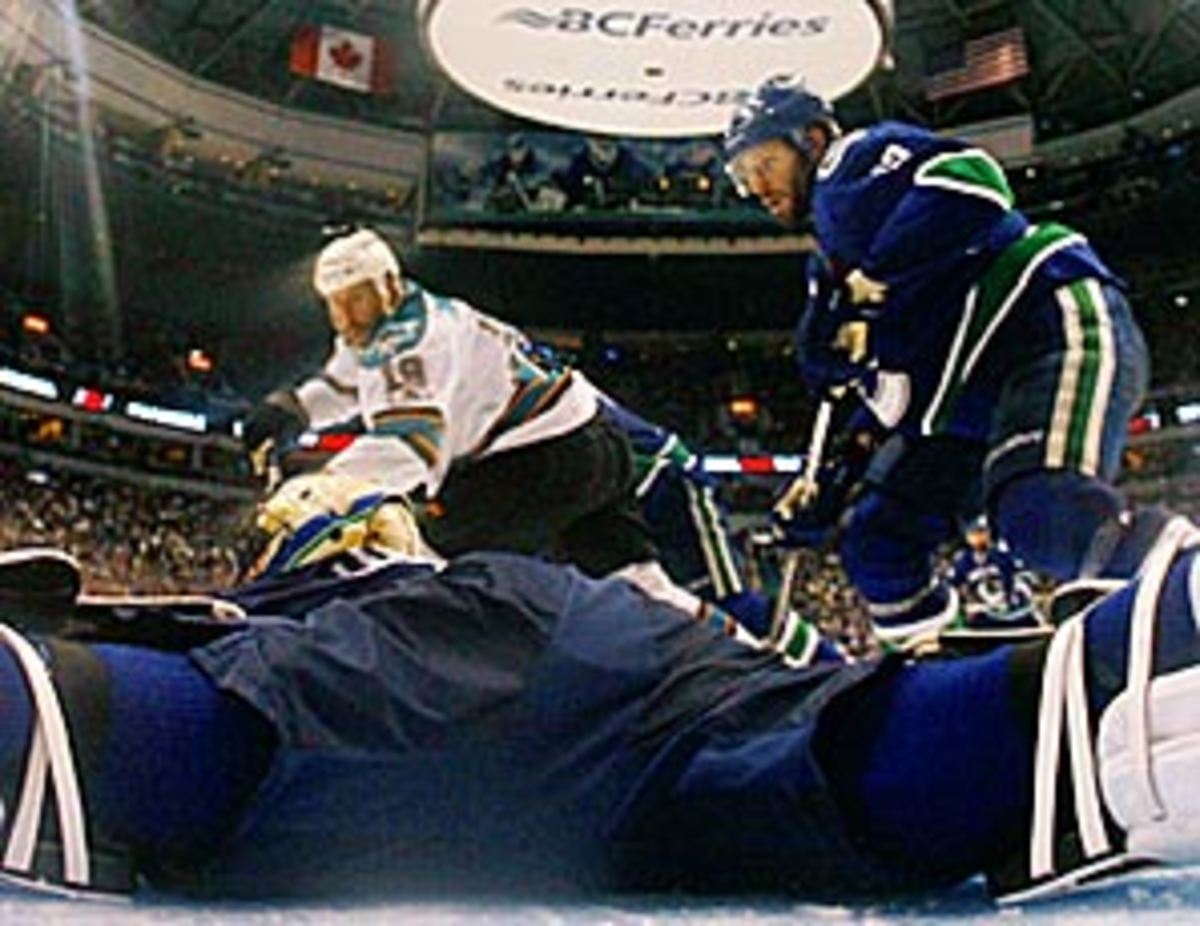Kesler, Thornton learning to lead
Leadership (noun)... the ability to guide, direct, or influence people.
There is something about playoff hockey that brings out the best in the players. It defines careers. Over the past few seasons, we've seen Sidney Crosby and Jonathan Toews show that there is such a thing as a born leader. Not often is it the case when young stars like those two have the maturity to live by the dictionary definition of leadership and also come through when it matters most.
Both Crosby and Toews put Stanley Cups on their respective resumes by the age of 22 and followed that up by continuing to strive to get better individually for the betterment of their teams. This spring, we're seeing two more prime, but different, examples in Ryan Kesler, 26, and Joe Thornton, 31. Both are exhibiting heightened leadership capabilities while following a career path that is more the NHL norm. That is to say, Kesler and Thornton have grown into leadership roles through sometimes bitter experience and tough self-examination.
Kesler's and Thornton's career experiences have been positive in terms of individual on-ice production and accolades, but frustrating as evidenced by their being characterized as selfish and underachieving. Kesler entered the 2010-11 season with the mindset that he had to curtail all of the extracurricular jawing and trash-talking that had always been a part of who he was as a player. It was an element of his game that he finally concluded didn't need to be there. He's stuck to business amd elevated his game and he absolutely took over the Canucks' Western Conference Semi-final series against Nashville.
Thornton's odyssey has been one of living up to the great external expectations that are imposed on a player of his size and talent as well as his status as a top overall draft pick (1997). There has always been a feeling that Jumbo Joe should show more -- take over games more often, show more fire, use his size to a physical advantage more readily, and not accept being a perimeter player so easily. Some of those views were valid and some were born of a tendency to demand that big players stand out more often because, well, their size alone makes them stand out. Their on-ice performance should be similarly big.
Thornton's transformation has made his play this postseason transcendent. Playing with the puck has always been easy for him, while his play without it throughout his career has often meant merely taking the easy way out. By connection, the Sharks' inability to get to the Stanley Cup Final, despite years of being a top regular season team, has earned Thornton the underachiever tag.
Right or wrong, that tag is no more. Thornton is taking pride in the details, winning face-offs, battling hard for pucks that are up for grabs along the boards, and trying to shut down the opposition's top offensive center. He is fully vested in playing what coaches call a complete "200-foot game." There are no shifts off and no situation too small not to fully engage in no matter where on the ice it occurs. When a team's best player invests himself totally in his club's success, he arrives at that elusive and revered point as the leader. Thornton might not even recognize the difference because, naturally, he always thought he played hard and wanted to win, which is true. No one competes to lose. But, from the outside looking in -- and more importantly inside the Sharks' dressing room -- the difference in his play and the results are vast.
Kesler's and Thornton's arrival as bona fide team leaders is reminiscent to two of the NHL's most notable in recent memory. Mark Messier was a feisty, big body centerman like Kesler who early in his career would punish players with devastating body checks just because he could. Over time, Messier tempered that approach, using his physical play judiciously, which made him a more productive team player. His delivery via a hat trick on a public promise that his New York Rangers would prevail in a must-win conference finals game against the New Jersey Devils in 1994 is the stuff of legend, and he went on to lead his team to the franchise's first Stanley Cup in 54 years. What people forget is the journey that Messier took from his reckless abandon days with the high-powered Oilers to that of revered leader in Edmonton and, later, New York.
In Thornton, the parallel might end up being Steve Yzerman. After years of piling up prodigious point totals, yet failing to win the coveted Cup, Yzerman transformed himself into the consummate two-way player. He was captain for over two decades, but winning proved elusive for his Red Wings. Much of the chatter associated with Thornton similarly dogged Yzerman. His leadership development also included heroic returns from devastating injuries and a melding of the minds when legendary coach Scotty Bowman took over in the Motor City. The results were breathtaking as the Red Wings won three Stanley Cups, transforming Yzerman's legacy to one of leadership personified.
All that's left for both Kesler and Thornton now is the ultimate winning. That the pair is squaring off in the Western Conference Final just makes for greater theater, especially given their respective teams' histories of bitter playoff disappointment. Adding to the intrigue is that they are matched up against each other in this series head-to-head. That isn't lost on either of them as both Kesler and Thornton jousted before the opening face-off of Game 1. Only one will move on and have a chance to further solidify his reputation by hoisting the Cup. Still, as developing leaders, both Ryan Kesler and Joe Thornton are well on their way.






